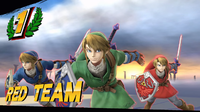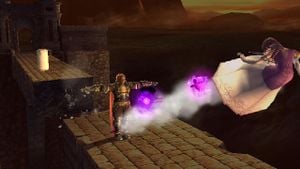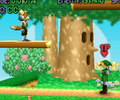T-pose
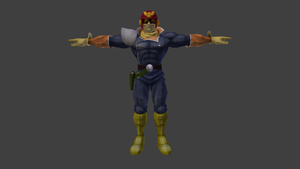
A T-pose, sometimes known as a bind pose or reference pose, is the default, unanimated state of a 3D model. The model's moving parts are all straightened out or flattened for ease of animation; in most cases, this results in a pose where the character stands erect and stretches their arms out horizontally on either side, resembling the letter "T".
Description
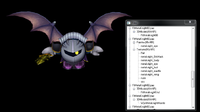
In works that use 3D computer-generated graphics, such as animated films and video games, character models are created, textured, and rigged before any animation work is done. The "bind pose" is the model's default pose used during development, which is then deformed to create animations. As expected, the Super Smash Bros. series uses bind poses to animate its characters, and players can view these using external programs, such as BRRES Viewer.
The vast majority of characters in Smash use standard T-poses, but certain characters have variants due to their body characteristics. Yoshi and R.O.B., for instance, have their arms extended in front of their bodies, while Ganondorf's armour in Melee forces him to take on an "A-pose" instead of a T-pose. Although Link's model uses the standard T-pose within the files of Smash 4, if his bind pose is forced to display through glitches, it will instead appear as a more dynamic battle pose.
Characters that use model effects for facial expressions (such as Sonic or Kirby) may appear with unusual facial expressions when viewed in their bind pose. For example, Sonic's eyes will always appear closed, while Kirby's mouth will be forced into the "O" shape used for his Inhale.
In gameplay
Bind poses are generally only intended for game development and, in theory, they should never be seen in the actual gameplay of a final product. In Super Smash Bros. Brawl, however, some attacks will cause bind poses to appear for a single frame, such as Olimar's Pikmin Chain and Ganondorf's Beast Ganon; seeing these bind poses, however, requires almost perfect timing with the pause button, as well as external help by slowing the game's pace down considerably.
Hacks and glitches are the most common method to seeing bind poses appear in gameplay, as they act as a failsafes for animations that do not exist, thus helping to prevent game crashes. Moveset swap hacks, for instance, are particularly notorious for featuring numerous bind poses, as bind poses are used when the two involved characters' special moves have an unequal number of frames or if the two animations have different names. Furthermore, hacking ordinarily non-playable characters into matches, such as Giga Bowser, will cause their losing poses to be the bind pose on the results screen, due to a lack of "applause" animations.
In Smash 4, a glitch could also force bind poses to appear on the results screen if the Home button was pressed one frame before the beginning of the victory pose, as it could prevent the game from properly loading such poses; this glitch was later patched out in version 1.1.0. Version 3.0.0 of Ultimate has a glitch that can be done in Stage Builder that allows the player to put any character in a bind pose; it is performed by inhaling or swallowing an opponent with Kirby or King Dedede while testing a stage, and then resetting the test and pausing, as the pose is only visible for a single frame.[1] As of 8.0.0, this glitch has not been patched.
Also in Ultimate, Min Min can perform a T-pose glitch using her forward tilt with Ram Ram, a smash attack with Dragon, and then performing an up taunt. With proper timing with the up taunt, Min Min will be stuck in the pose.
Gallery
Two bind poses in SSB; note how Link is in the standard T-pose while Fox is not.
Mario, using Luigi's moveset through hacks, enters a bind pose due to a lack of suitable animations for Luigi Cyclone.
Mewtwo and Ganondorf's bind poses in Super Smash Bros. for Wii U, shown via a glitch. Note the aura around Mewtwo's body.
Giga Bowser's bind pose in Ultimate.
